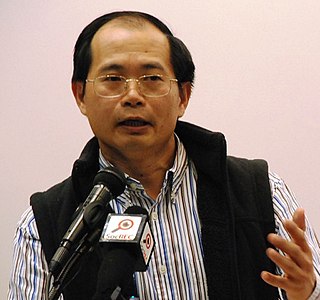Grassroots democracy is a tendency towards designing political processes that shift as much decision-making authority as practical to the organization's lowest geographic or social level of organization.
Subsidiarity is a principle of social organization that holds that social and political issues should be dealt with at the most immediate or local level that is consistent with their resolution. The Oxford English Dictionary defines subsidiarity as "the principle that a central authority should have a subsidiary function, performing only those tasks which cannot be performed at a more local level". The concept is applicable in the fields of government, political science, neuropsychology, cybernetics, management and in military command. The OED adds that the term "subsidiarity" in English follows the early German usage of "Subsidiarität". More distantly, it is derived from the Latin verb subsidio, and the related noun subsidium.
Cosmopolitanism is the idea that all human beings are members of a single community. Its adherents are known as cosmopolitan or cosmopolite. Cosmopolitanism is both prescriptive and aspirational, believing humans can and should be "world citizens" in a "universal community". The idea encompasses different dimensions and avenues of community, such as promoting universal moral standards, establishing global political structures, or developing a platform for mutual cultural expression and tolerance.

In England, a civil parish is a type of administrative parish used for local government. It is a territorial designation which is the lowest tier of local government. Civil parishes can trace their origin to the ancient system of parishes, which for centuries were the principal unit of secular and religious administration in most of England and Wales. Civil and religious parishes were formally split into two types in the 19th century and are now entirely separate. Civil parishes in their modern form came into being through the Local Government Act 1894, which established elected parish councils to take on the secular functions of the parish vestry.
Globalism has multiple meanings. In political science, it is used to describe "attempts to understand all of the interconnections of the modern world—and to highlight patterns that underlie them". While primarily associated with world-systems, it can be used to describe other global trends. The concept of globalism is also classically used to focus on ideologies of globalization instead of its processes ; in this sense, "globalism" is to globalization what "nationalism" is to nationality.
Regionalism is a political ideology that seeks to increase the political power, influence and self-determination of the people of one or more subnational regions. It focuses on the "development of a political or social system based on one or more" regions, and/or the national, normative, or economic interests of a specific region, group of regions or another subnational entity, gaining strength from or aiming to strengthen the "consciousness of and loyalty to a distinct region with a homogeneous population", similarly to nationalism. More specifically, "regionalism refers to three distinct elements: movements demanding territorial autonomy within unitary states; the organization of the central state on a regional basis for the delivery of its policies including regional development policies; political decentralization and regional autonomy".
New localism is a concept associated with Tony Blair's Labour government in the United Kingdom. It was intended to indicate a cautious devolution of power to the local level in an attempt to better implement national goals.
Localism is a range of political philosophies which prioritize the local. Generally, localism supports local production and consumption of goods, local control of government, and promotion of local history, local culture and local identity. Localism can be contrasted with regionalism and centralized government, with its opposite being found in unitarism.

History of the Kuomintang cultural policy is an article about the cultural suppression during the early postwar period (1945–1960) in Taiwan. The Kuomintang suppressed localism and barred Taiwanese from cosmopolitan life except in the spheres of science and technology. The authoritarian KMT dominated public cultural space and Chinese nationalist networks became a part of cultural institutions, leaving little resource for cultural autonomy to grow.
Accountable autonomy is an institutional design of administrative and democratic organization that tries to maximize civic participation and deliberation. Political scientist Archon Fung coined the term. Accountable autonomy addresses the defects of decentralization and localism, such as group-think, inequality, and parochialism, through hybrid arrangements that allocate political power, function and responsibility between central authorities and local bodies. The terms “accountable” and “autonomy” might seem at odds. Autonomy means independence from central power and the capacity to accomplish its ends. The second sense is what Fung stresses: ‘a conception of centralized action that counter-intuitively bolsters local capability without improperly and destructively encroaching upon it.’
Subsidiarity is an organizing principle that matters ought to be handled by the smallest, lowest or least centralized competent authority. Political decisions should be taken at a local level if possible, rather than by a central authority. The Oxford English Dictionary defines subsidiarity as the idea that a central authority should have a subsidiary function, performing only those tasks which cannot be performed effectively at a more immediate or local level.
Types of democracy refers to the various governance structures that embody the principles of democracy in some way. Democracy is frequently applied to governments, but may also be applied to other constructs like workplaces, families, community associations, and so forth.
Everett Carll Ladd Jr. was an American political scientist based at the University of Connecticut. He was best known for his analysis and collection of public opinion polls. He directed the Roper Center for Public Opinion Research at the University of Connecticut; the Center's mission is to collect and preserve the reports and the original raw computerized data of polls and surveys since the 1930s. At his death, he had amassed 14,000 surveys from many countries. He was also an expert on the opinions and careers of social scientists.

Civic Passion was a radical, populist, localist, and nativist political party in Hong Kong. Founded by Wong Yeung-tat as an activist group in 2012, it held strong localist views and opposed the involvement of the Chinese government in the governance of Hong Kong. In the 2016 Legislative Council election, the Civic Passion formed an electoral alliance with Wong Yuk-man's Proletariat Political Institute and Chin Wan's Hong Kong Resurgence Order. Cheng Chung-tai became the only candidate of the alliance elected to the legislature and subsequently took over as the leader of the Civic Passion. After the election, Cheng reorganised the group into a political party and pulled out from the social activism. From December 2020 to August 2021, it was the only opposition party in the Legislative Council of Hong Kong.

Horace Chin Wan-kan, better known by his pen name Chin Wan, is a Hong Kong scholar advocating localism, best known for his publications On the Hong Kong City-State series. He is the founder and leader of the Hong Kong Resurgence Order and is the ideological leader of the "Hong Kong Autonomy Movement," dubbed as the "godfather of localism" in Hong Kong. Until mid-2016, Chin was an assistant professor at the Department of Chinese of Lingnan University.

Youngspiration is a localist political party in Hong Kong founded in 2015. It emerged after the 2014 Hong Kong protests with an agenda of protection of Hong Kong people's interests and culture against the interference of the Chinese government and advocated the "Hong Kong nation's right to self-determination". The group wants a self-determination referendum in 2020 with the results effective in 2047, when China's "one country, two systems" promise ends. As of 2016, the convenor of the group is Baggio Leung.

In Hong Kong, localism is a political movement centred on the preservation of the city's autonomy and local culture. The Hong Kong localist movement encompasses a variety of groups with different goals, but all of them oppose the perceived growing encroachment of the Chinese central government on the city's management of its own political, economic, and social affairs. While the movement's milder elements advocate for greater autonomy while remaining as part of China, the more radical elements call for a return to British rule or full independence as a sovereign state. Some also advocate for a more aggressive and militant stance against the mainland government in defending local interests. For that reason, they are labelled as "radicals" and "separatists" by the Chinese government. Issues of concern to the localist camp include land use and development, cultural and heritage conservation, parallel trading, and the increasing number of mainland immigrants and mainland tourists. Although grouped together with liberals, they have a distinct view as they advocate for Hongkongers' right to self-determination. In the aftermath of the 2019–2020 Hong Kong protests, localists were largely absorbed into the pro-democracy camp.

Localist camp or localist and self-determination groups refers to the various groups with localist ideologies in Hong Kong. It emerged from post-80s social movements in the late 2000s which centred on the preservation of the city's autonomy and local lifestyles and opposed the perceived growing encroachment of the Chinese government on the city's management of its own political, economic, and social affairs.
Bong is a neologism that originated in cosmopolitan India in the 1980s as a slightly pejorative exonym for the educated middle-class Bengalis from the Indian state of West Bengal. In the 21st century, the term became a self-appellation of pride through the use of satire and self-reflexive irony by the Bengali blogging community, which came to stand for West Bengalis as a whole. Bong has been noted as a word of Indian English, used in the Indian newspapers.
Cosmopolitan localism or Cosmolocalism is a social innovation approach to community development that seeks to link local and global communities through resilient infrastructures that bring production and consumption closer together, building on distributed systems. The concept of cosmopolitan localism was pioneered by Wolfgang Sachs, a scholar in the field of environment, development, and globalization. Sachs is known as one of the many followers of Ivan Illich and his work has influenced the green and ecological movements. Contrary to glocalisation, cosmolocalism moves from locality to universality, acknowledging the local as the locus of social co-existence and emphasizing the potential of global networking beyond capitalist market rules.





